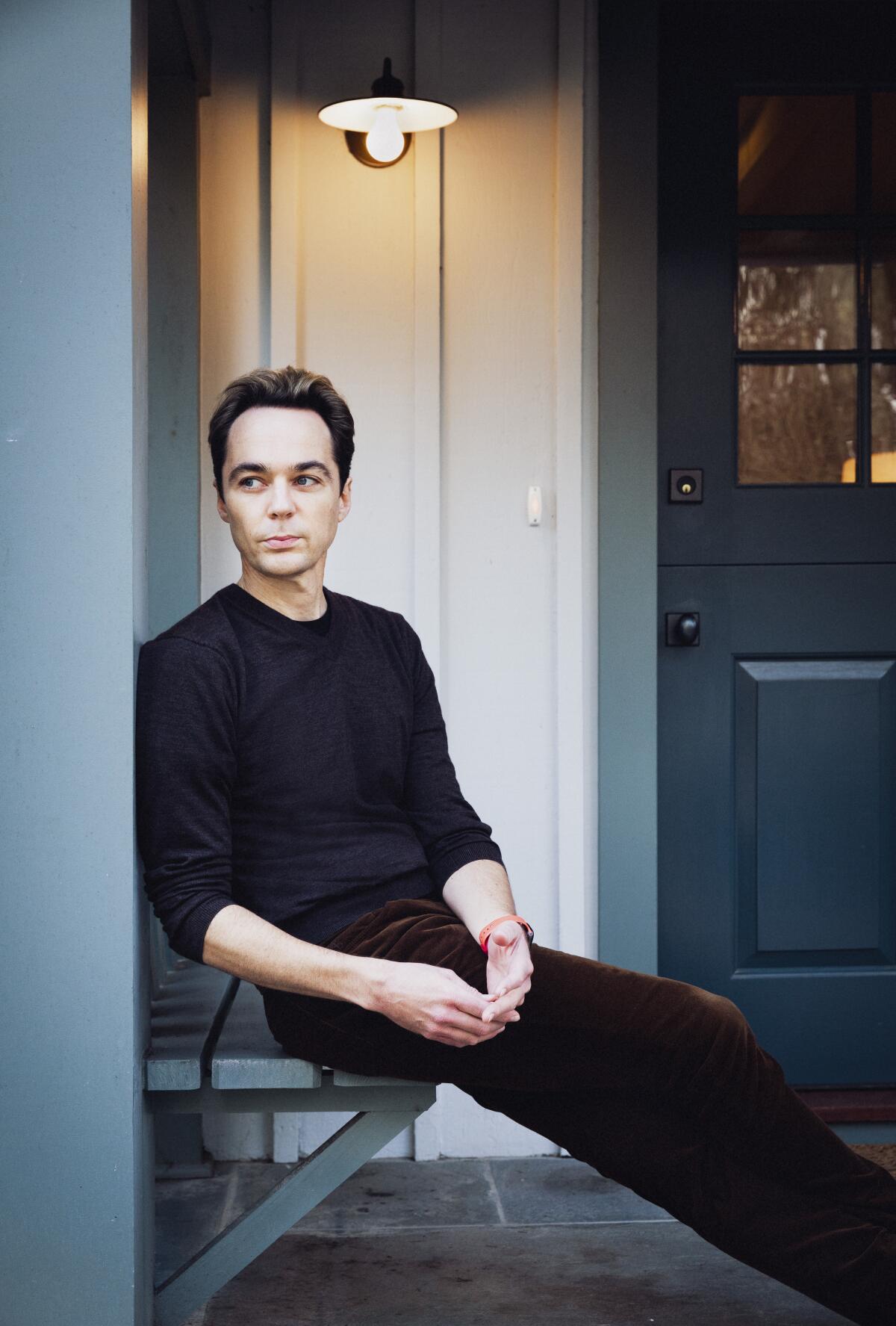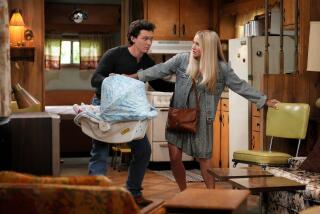Jim Parsons finds the modern relevance to his ‘Boys in the Band’ role

There are not a lot of actors who can follow up 12 seasons as the star of a hugely popular sitcom with meaty roles in serious dramas. But then again, Jim Parsons is not your ordinary star. The very likable 47-year-old, who took home four Emmys for playing geeky Caltech physicist Sheldon Cooper on the CBS hit “The Big Bang Theory,” has been able to pivot smoothly to dramas such as “The Normal Heart” (2014), “Hidden Figures” (2016) and “A Kid Like Jake” (2018).
This year, the Houston-born actor doubled down, playing corrupt talent agent Harry Willson in the Netflix miniseries “Hollywood” and reprising his Broadway role as Michael, the self-hating center of Mart Crowley’s “The Boys in the Band,” in the movie adaptation that premiered on Netflix in September.
During a recent phone call from his home in New York, Parsons says he knew quite well that playing Michael, the self-hating host of a birthday party attended by a group of gay men in pre-Stonewall-era New York, was going to be a complicated journey. “I have to admit that, at first, I didn’t quite understand where my character was coming from,” he says. “I was excited to be part of this seminal piece of gay theater, but I was a bit trepidatious about the whole thing. Soon, though, the historic importance and societal impact of the piece grew on me. I don’t think it would have hit me as hard if we hadn’t had the chance to shoot the movie version after doing the play on Broadway two years ago.”
“The Boys in the Band” — Mart Crowley’s landmark gay story that’s at once dated and timely — captures the bonds of friendship, even when it gets ugly.
The actor believes the importance and impact of the play has evolved since its debut in 1968. “I feel that it offered a representation of a particular group of gay men at a time that was vastly different from the world that I grew up in,” says Parsons. “As we were researching the period, it was jaw-dropping to be presented with articles from the New York Times where gay men were referred to in such derogatory terms and presented as animalistic and disgusting. It really put into perspective the lens through which the play’s characters were viewing both themselves and the world. Here we have a picture of a group of gay men who had to depend on each other for emotional and physical safety.”
While Crowley’s play was a brutally honest look at the characters of that specific period, Parsons says, it also can be viewed as a portrait of other groups who are seen as “the other” by society. “While things are much better for homosexuals in our country and the world today, there are always other people or other groups that are victimized and discriminated against,” he says. “That’s why the play has been such a lightning rod and traveled so far since it was first written. What these characters are going through is easily applicable to many other marginalized groups or people.”
Being part of the Tony-winning Broadway revival, which featured an entirely openly gay cast including Zachary Quinto, Matt Bomer, Andrew Rannells, Michael Benjamin Washington and Tuck Watkins, was a remarkable experience for Parsons. (Crowley, who died in March, has a brief cameo in the movie as well.) “There was so much shared history with the cast, the characters and material, it was both comforting and exhilarating,” Parsons notes. “The intimacy afforded by the camera as opposed to stage work also made more sense and felt easier to play.”
Director Joe Mantello and star Jim Parsons explain the process of transferring their Tony-winning Broadway revival of “The Boys in the Band” to a Netflix film.
When asked about the ongoing debate over whether straight actors should portray LGBTQ characters in entertainment, Parsons responds, “There’s definitely this spectrum: I think the fight, as it were, is not about having only gay people play the gay parts but to ensure that all parts are open to all actors. It’s important that gay characters are portrayed as well-rounded and completely human individuals.
“And there are plenty of straight actors who have played gay characters brilliantly. I think ‘Brokeback Mountain’ is one of the most touching gay movies and love stories I have ever seen, and those two straight actors [Heath Ledger and Jake Gyllenhaal] were the best choices for those roles.”
Parsons, who is married to his longtime partner, producer Todd Spiewak, came out during a 2008 interview when he was promoting “The Normal Heart.” He mentions that portraying a woman in a Charles Busch play in Houston was a life-changing moment in his career. “When I was studying theater at school, I wasn’t worried about coming out. I was more concerned that at a small level, I would always seem gay in every role that I took. That was something that held me back.
“But when I performed in drag in the Busch play, I felt that there was this permission that was granted and I didn’t have to worry about appearing gay. Once you taste that level of freedom, there’s really no going back.”
Such films as ‘Boys in the Band,’ ‘Ammonite,’ ‘Ma Rainey’s Black Bottom’ and others balance historical accuracy with new stories that dodge tired tropes.
More to Read
From the Oscars to the Emmys.
Get the Envelope newsletter for exclusive awards season coverage, behind-the-scenes stories from the Envelope podcast and columnist Glenn Whipp’s must-read analysis.
You may occasionally receive promotional content from the Los Angeles Times.










